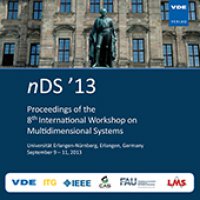Applications Oriented Stability Theory for Discrete Linear Repetitive Processes
Conference: nDS '13 - Proceedings of the 8th International Workshop on Multidimensional Systems
09/09/2013 - 09/11/2013 at Erlangen, Deutschland
Proceedings: nDS '13
Pages: 6Language: englishTyp: PDF
Personal VDE Members are entitled to a 10% discount on this title
Authors:
Dabkowski, Pawel (Institute of Physics. Nicolaus Copernicus University, in Torun, Poland)
Galkowski, Krzysztof (Institute of Control and Computation Engineering, University of Zielona Gora)
Rogers, Eric (Electronics and Computer Science, University of Southampton, Southampton, UK)
Abstract:
Many systems repeat the same operation over and over again on a finite duration. Repetitive processes have this characteristic where repeated sweeps, termed passes, are made over the finite pass length and when each is complete the process resets to the starting location and the next pass begins. The distinguishing feature of these processes is that the output, or pass profile, produced on each pass explicitly contributes to the dynamics of the next one and can result in oscillations that increase in amplitude from pass-to-pass. For applications, it is necessary to have a stability theory on which to base control law design for stabilization and performance. This paper gives a reflective overview of the stability theory for linear repetitive processes with particular attention to the forms of stability possible, their characterizations, and suitability for control law design. A particular feature is that the strongest form of stability for these processes can, especially for applications, lead to difficulties in control law design for stability and performance. One alternative in such cases is also considered.


